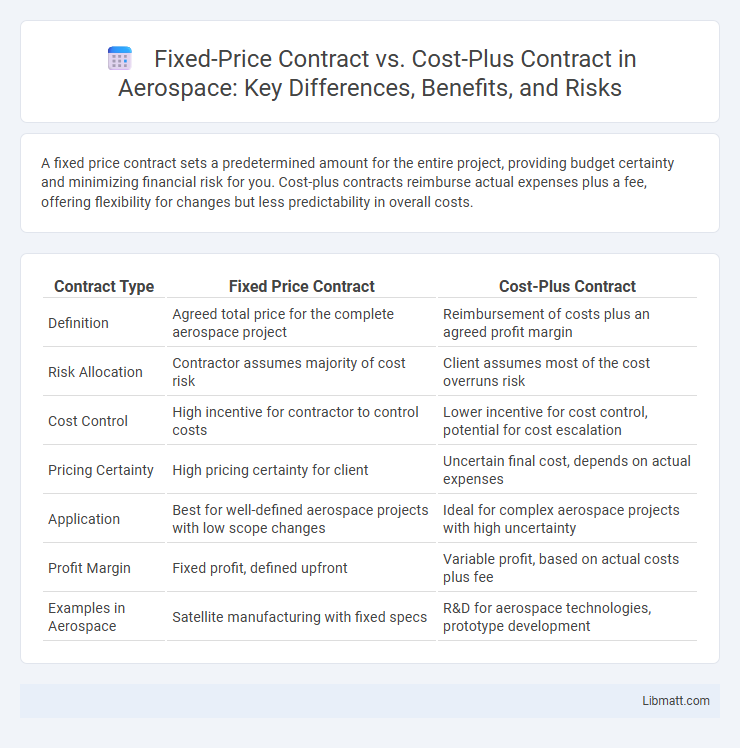A fixed price contract sets a predetermined amount for the entire project, providing budget certainty and minimizing financial risk for you. Cost-plus contracts reimburse actual expenses plus a fee, offering flexibility for changes but less predictability in overall costs.
Table of Comparison
| Contract Type | Fixed Price Contract | Cost-Plus Contract |
|---|---|---|
| Definition | Agreed total price for the complete aerospace project | Reimbursement of costs plus an agreed profit margin |
| Risk Allocation | Contractor assumes majority of cost risk | Client assumes most of the cost overruns risk |
| Cost Control | High incentive for contractor to control costs | Lower incentive for cost control, potential for cost escalation |
| Pricing Certainty | High pricing certainty for client | Uncertain final cost, depends on actual expenses |
| Application | Best for well-defined aerospace projects with low scope changes | Ideal for complex aerospace projects with high uncertainty |
| Profit Margin | Fixed profit, defined upfront | Variable profit, based on actual costs plus fee |
| Examples in Aerospace | Satellite manufacturing with fixed specs | R&D for aerospace technologies, prototype development |
Introduction to Fixed Price and Cost-Plus Contracts
Fixed Price Contracts establish a set price for a project, providing budget certainty by requiring the contractor to complete the work within the agreed cost. Cost-Plus Contracts reimburse the contractor for actual expenses plus a guaranteed fee or percentage, offering flexibility when project scope or costs are uncertain. Understanding these contract types helps you choose the best approach for managing financial risk and project complexity.
Defining Fixed Price Contracts
Fixed Price Contracts establish a set payment amount agreed upon before project initiation, regardless of actual costs incurred. These contracts transfer financial risk to the contractor by requiring them to complete the work within the fixed budget. They are commonly used in construction and manufacturing projects where scope and specifications are well-defined.
Defining Cost-Plus Contracts
Cost-plus contracts require the buyer to reimburse the seller for actual costs incurred plus an agreed-upon fee or percentage for profit, providing flexibility in project scope changes. These contracts transfer most of the financial risk to the buyer while ensuring the contractor covers expenses, making them ideal for projects with uncertain costs. Cost-plus contracts often include provisions such as guaranteed maximum price to limit overall expenditures.
Key Differences Between Fixed Price and Cost-Plus Contracts
Fixed Price Contracts establish a set price for the entire project, transferring financial risk to the contractor and ensuring budget predictability. Cost-Plus Contracts reimburse actual costs plus a predefined fee or percentage, providing flexibility but increasing the owner's financial risk due to potential cost overruns. The choice impacts project management, risk allocation, and cost control strategies in construction and service agreements.
Advantages of Fixed Price Contracts
Fixed Price Contracts offer budget certainty by establishing a set price for the entire project, minimizing financial risk for you. These contracts incentivize contractors to complete work efficiently, often resulting in faster delivery times and cost savings. Clear cost expectations and simplified payment processes enhance project management and reduce disputes.
Advantages of Cost-Plus Contracts
Cost-plus contracts provide transparency by reimbursing actual costs plus a fixed fee, which encourages efficient project management and reduces financial risk for contractors. You benefit from flexibility in accommodating project scope changes without renegotiating the entire contract. These contracts foster collaboration and allow for higher quality outcomes when project details are uncertain or evolving.
Risks and Challenges of Fixed Price Contracts
Fixed Price Contracts pose significant risks such as budget overruns and scope creep, which can strain project resources and timelines. The contractor assumes most financial risks, making unforeseen changes or inaccuracies in project estimates costly. You must ensure precise project specifications and thorough risk assessments to mitigate potential disputes and maintain profitability under these contracts.
Risks and Challenges of Cost-Plus Contracts
Cost-plus contracts pose risks such as escalating project costs due to lack of a fixed budget, placing financial uncertainty on the client. Your ability to control expenses may be limited, as contractors have less incentive to minimize costs compared to fixed-price contracts. These challenges require thorough oversight and transparent cost tracking to prevent budget overruns and ensure project success.
When to Choose Fixed Price Over Cost-Plus Contracts
Choose a fixed price contract when the project scope, specifications, and timeline are clearly defined, allowing for predictable budgeting and risk allocation. Fixed price contracts benefit clients who prioritize cost certainty and want to avoid unexpected expenses during project execution. Your best choice is a fixed price contract if minimizing financial risks and ensuring firm cost control are crucial for project success.
Conclusion: Making the Right Contract Choice
Choosing between a Fixed Price Contract and a Cost-Plus Contract depends on your project's risk tolerance and budget certainty. Fixed Price Contracts offer predictability and cost control, ideal for well-defined scopes, while Cost-Plus Contracts provide flexibility for projects with uncertain requirements but can lead to variable expenses. Evaluating your project's complexity and financial priorities ensures the right contract choice aligns with your goals.
Fixed Price Contract vs Cost-Plus Contract Infographic

 libmatt.com
libmatt.com